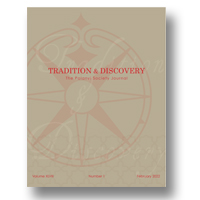|
|
|
1.
|
Tradition and Discovery: The Polanyi Society Periodical:
Volume >
35 >
Issue: 1
Phil Mullins
Preface
view |
rights & permissions
| cited by
|
|
|
|
|
|
|
2.
|
Tradition and Discovery: The Polanyi Society Periodical:
Volume >
35 >
Issue: 1
News and Notes
view |
rights & permissions
| cited by
|
|
|
|
|
|
|
3.
|
Tradition and Discovery: The Polanyi Society Periodical:
Volume >
35 >
Issue: 1
Fall and Winter 2008 Polanyi Society Meetings
view |
rights & permissions
| cited by
|
|
|
|
|
|
|
4.
|
Tradition and Discovery: The Polanyi Society Periodical:
Volume >
35 >
Issue: 1
Notes on Contributors
view |
rights & permissions
| cited by
|
|
|
|
|
|
|
5.
|
Tradition and Discovery: The Polanyi Society Periodical:
Volume >
35 >
Issue: 1
William Kelleher
Respect and Empathy in the Social Scicnce Writings of Michael Polanyi
abstract |
view |
rights & permissions
| cited by
This essay first explains Polanyi’s theory of the evolutionary genesis of humanity’s distinctive calling to strive to be rational. It shows how Polanyi envisioned human rationality as necessarily entailing a natural respect for other people. Finally, the essay shows how Polanyi shapes a method for a critical social seience, which is consistent with his understanding of human rationality.
|
|
|
|
|
|
|
6.
|
Tradition and Discovery: The Polanyi Society Periodical:
Volume >
35 >
Issue: 1
Information on Polanyi Society Electronic Discussion List
view |
rights & permissions
| cited by
|
|
|
|
|
|
|
7.
|
Tradition and Discovery: The Polanyi Society Periodical:
Volume >
35 >
Issue: 1
R. P. Doede
Polanyi in the Face of Transhumanism
abstract |
view |
rights & permissions
| cited by
This essay gives a brief overview of Transhumanism and explores a few of its central ideas in the light of Polanyi’s views about embodiment, Marxism, and reality’s hierarchal order, concluding that although Polanyi would likely appreciate the possibilities of cyborgic augmentation that feature in the Transhumanist route to the posthuman, he would utterly repudiate its metaphysics of disembodied intelligence and its underlying technological determinism.
|
|
|
|
|
|
|
8.
|
Tradition and Discovery: The Polanyi Society Periodical:
Volume >
35 >
Issue: 1
John Apczynski
Andrew Grosso on Polanyi as a Resource for Christian Theology
abstract |
view |
rights & permissions
| cited by
These reflections on Andrew Grosso’s recent book Personal Being highlight his philosophical construction of a concept of personhood based on themes from the writings Of Michael Polanyi and his use of this conception to express creatively elements of the traditional Christian doctrines on the trinity. Additional clarifications are sought regarding his formulations on the divine personhood of Jesus, the adequacy of his formulations on the intra-trinitarian relations, and the insightfulness of the absolute personhood of the divine. This study is a helpful model for extending Polanyian insights into the realm of dogmatic theology.
|
|
|
|
|
|
|
9.
|
Tradition and Discovery: The Polanyi Society Periodical:
Volume >
35 >
Issue: 1
Andrew Grosso
Re-Visiting Personal Being:
A Response To Apczynski’s Review
abstract |
view |
rights & permissions
| cited by
This brief essay addresses questions raised by John Apczynski’s review of my book, Personal Being, especially (1) the nature of subsidiary indwelling, (2) the ontological ramifications of Polanyi’s thought, and (3) the transposition of Christian doctrine in a more contemporary, Polanyian key.
|
|
|
|
|
reviews |
|
10.
|
Tradition and Discovery: The Polanyi Society Periodical:
Volume >
35 >
Issue: 1
Walter Gulick
The Search for Meaning:
A Short History
view |
rights & permissions
| cited by
|
|
|
|
|
11.
|
Tradition and Discovery: The Polanyi Society Periodical:
Volume >
35 >
Issue: 1
Paul Lewis
The Heart of Judgment:
Practical Wisdom, Neuroscience, and Narrative
view |
rights & permissions
| cited by
|
|
|
|
|
12.
|
Tradition and Discovery: The Polanyi Society Periodical:
Volume >
35 >
Issue: 1
David Nikkel
Divine Revelation and Human Practice:
Responsive and Imaginative Participation
view |
rights & permissions
| cited by
|
|
|
|





